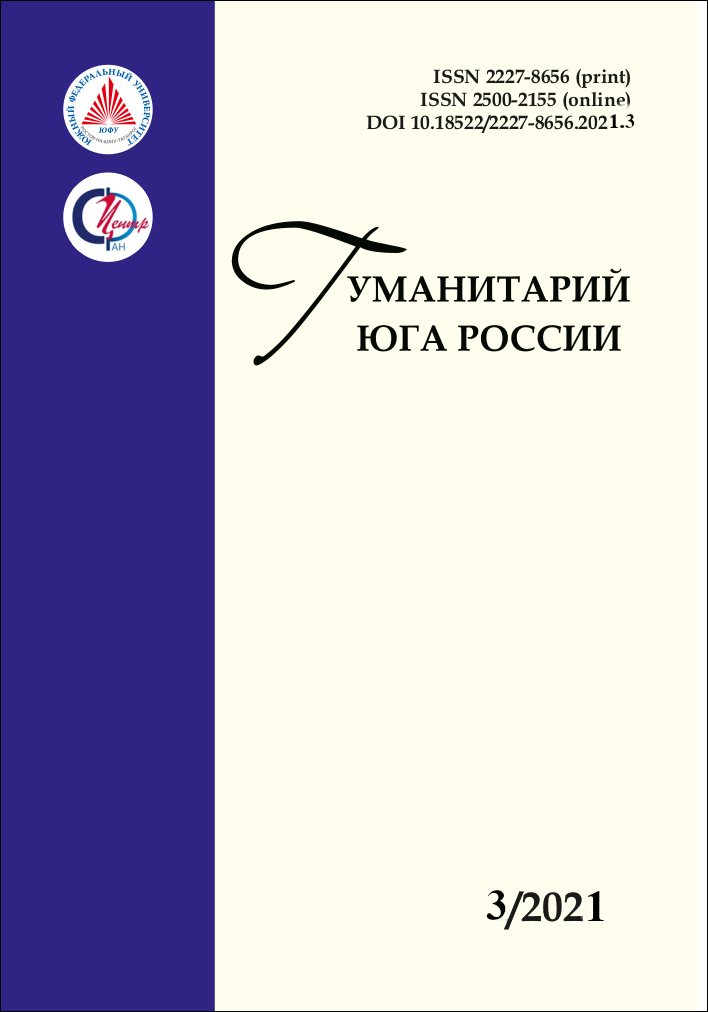Dynamics of Student Youth Values in Russian Society in the Context of Digitalization of Higher Education
Research Article
How to Cite
Ivanenko N.S., Zagorodnyuk E.V. Dynamics of Student Youth Values in Russian Society in the Context of Digitalization of Higher Education. Humanities of the South of Russia. 2021. Vol. 10. No. 3. P. 138-147. DOI: https://doi.org/10.18522/2227-8656.2021.3.11 (in Russ.).
Abstract
Objective of the research is to study the dynamics of student youth values in the Russian society in the context of digitalization of higher education.
The methodological basis of the research was the subject-activity approach, which contains neoinstitutional, socio-dispositional, structural-activity procedures.
Research results. It is proved that digitalization, being a process of influence on the professional socialization of students, and actualizing the assessment of social and cultural differences in the youth environment in the mass moods, becomes a mediating factor in the transition to the synthesis of instrumental and fundamental values of modern students.
Prospects of the study are connected with further research on the study of youth values in the modern world.
Keywords:
digitalization, higher education, values, student youth, mobility, instrumental activism
References
1. Relevant problems of education: Collection of scientific works. (2003). D. L. Konstantinovsky, G. A. Cherednichenko (Eds.). Moscow: Raglant. (in Russian).
2. Gorshkov, M. K., Sheregi, F.E. (2020). Youth of Russia in the Mirror of Sociology. To the results of long-term research. Moscow: FNISTC RAS. (in Russian).
3. Zubok, Yu. A., Chuprov, V. I. (2008). Social regulation in conditions of uncertainty: theoretical and applied problems in the study of youth. Moscow: Academia. (in Russian).
4. Konstantinovsky, D. L., Voznesenskaya, E. D., Cherednichenko, G. A. (2014). Youth of Russia at the turn of the XX-XXI centuries: education, work, social well-being. Moscow: TSPiM. (in Russian).
5. Capitals and Regions in modern Russia: myths and reality fifteen years later. (2018). M. K. Gorshkov, N. E. Tikhonova (Eds.). Moscow: Ves’ mir. (in Russian).
6. Sappy, J., Relf, S. (2010). Digital technologies of education and their influence on traditional roles and practice. Journal of University Teaching and Pedagogical Practice, 7 (1), 1-17.
2. Gorshkov, M. K., Sheregi, F.E. (2020). Youth of Russia in the Mirror of Sociology. To the results of long-term research. Moscow: FNISTC RAS. (in Russian).
3. Zubok, Yu. A., Chuprov, V. I. (2008). Social regulation in conditions of uncertainty: theoretical and applied problems in the study of youth. Moscow: Academia. (in Russian).
4. Konstantinovsky, D. L., Voznesenskaya, E. D., Cherednichenko, G. A. (2014). Youth of Russia at the turn of the XX-XXI centuries: education, work, social well-being. Moscow: TSPiM. (in Russian).
5. Capitals and Regions in modern Russia: myths and reality fifteen years later. (2018). M. K. Gorshkov, N. E. Tikhonova (Eds.). Moscow: Ves’ mir. (in Russian).
6. Sappy, J., Relf, S. (2010). Digital technologies of education and their influence on traditional roles and practice. Journal of University Teaching and Pedagogical Practice, 7 (1), 1-17.
Article
Received: 07.05.2021
Accepted: 29.07.2021
Citation Formats
Other cite formats:
APA
Ivanenko, N. S., & Zagorodnyuk, E. V. (2021). Dynamics of Student Youth Values in Russian Society in the Context of Digitalization of Higher Education. Humanities of the South of Russia, 10(3), 138-147. https://doi.org/10.18522/2227-8656.2021.3.11
Section
YOUTH: CURRENT STATE AND DEVELOPMENT TRENDS






